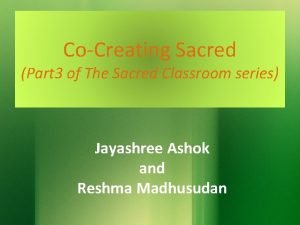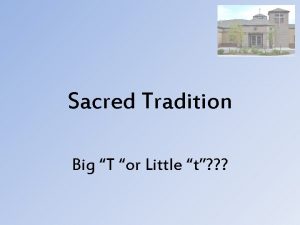ORIENTATION AND MOTIVATION FOR VALUE EDUCATION SACRED HEART





















- Slides: 21

ORIENTATION AND MOTIVATION FOR VALUE EDUCATION SACRED HEART COLLEGE JEEVANBHIMANAGAR, BANGALORE

I. Meaning of Value-Education: We shall begin with the fundamental question: What is Education? The very purpose and main function of education is the development of an all-round and well-balanced personality of the students. It is also to develop all dimensions of the human intellect so that our children can help make our nation more democratic, cohesive, socially responsible, culturally rich and intellectually competitive nation.

More than all these, education must make our students better human beings. But, nowadays, more emphasis is unduly laid on knowledge-based and information-oriented education which takes care of only the intellectual development of the students and their career. Value-education is the total of all the process by means of which a person develops abilities, attitudes and other forms of behaviour of the positive values in the society in which s/he lives.

II. What is Value Education? Today due to the changed understanding of education and due to the development of technology, the other important aspects of the personality like physical, emotional, social and spiritual are not properly developed in providing for the growth of attitudes, habits, values, skills and interests among the students. It is here that we need to speak about value-education. It has become so important today more than ever before.

Value-education is a many sided attempts and it is an activity during which young people are assisted by adults or older people in schools, families, homes, clubs, religious and other organizations. During these interactions, the young people make visible those underlying their own attitudes, to assess the effectiveness of these values for their own life and for others’ well-being.

Moreover a wide range of values of moral, aesthetic and social nature have evolved during the gradual growth and march of the human civilization. These are creating and posing before us a crisis of priorities: which of these values is to be cultivated and what is the appropriate stage of doing so? etc.

III. OBJECTIVES OF VALUE EDUCATION: Any education has certain objectives. In the same manner, value education also must have some clear objectives. Value education is not something that we give extra during extra times or free times. Value education is not an education that is considered by teachers as burdensome or botheration but it is an essential aspect of holistic or total education. Some of the characteristics of Value education are:

IV. Characteristics of Value education 1. Full development of student’s personality in its physical, mental, emotional and spiritual aspects. 2. Inculcation of good manners and being a responsible citizen. 3. Developing respect for the dignity of individual and society.

Characteristics of Value education 4. Inculcation of a spirit of patriotism and national integration. 5. Developing a democratic way of thinking and living. 6. Developing tolerance towards and understanding of different religious faiths and cultures.

Characteristics of Value education 7. Developing a sense of brotherhood/sisterhood at social, national and international levels. 8. Helping students to have faith in themselves and in God. 9. Enabling students to make decisions on the basis of sound moral principles. 10. Training them in human and divine values that would make them better human persons.

V. WHO HAS TO GIVE VALUE EDUCATION? Who is to inculcate values? Is it parents, teachers and good leaders? Or the affluent, the business tycoons, Politicians, Corporate high tech swamijis? The easy and obvious answer is: “The teacher is the prime inculcator of values because the young are under his or her formal care”.

Value education can also take place at home, as well as in schools, colleges, universities, and in voluntary organizations. There are two main approaches to values education. One is inculcating or transmitting a set of values which often comes from family, society or religious rules or cultural ethics.

The Second: The other is where people are gradually brought to their own realization by teaching, learning of what is good behavior for themselves and for the society.

VI. HOW CAN WE MAKE THE VALUE EDUCATION AS VALUE ORIENTED? There are many ways to make value education as really valuable. • The teachers have to take troubles and make some extra efforts to prepare the lesson plan well, and make the value education classes interesting and relevant. • The staff need some training in value education and on values and ethics. • Preparing a value education text book that is relevant for the college.

There are many types of values that this value education classes can focus on. Some of them are: 1. Human Values: The basic human values can be the starting point. Human values are the virtues that guide us to take into account the human element when we interact with other human beings. Human values are, for example, respect, acceptance, consideration, appreciation, listening, openness, affection, empathy and love towards other human beings.

2. Social Values: Love, compassion, tolerance and justice which are the basic teachings of most of our religions need to be woven into then social fabric of every human person. These are the values to be nurtured so that all forms of life are protected.

3. Cultural and Religious Values: These are the values enshrined in Vedas like ‘Dehi me dadami te’ i. e. “you give me and I give you” (Yajurveda) emphasize that we should not exploit anyone without nurturing them. Our cultural customs and rituals in many ways teach us to respect every one including nature, treating them as sacred like rivers, earth, mountains or forests.

4. Ethical Values: Ethical Values are those which serve to distinguish between good and bad, right and wrong, and moral and immoral. At a societal level, these values frequently form a basis for what is permitted and what is prohibited. Ethics are the set of rules that govern the behaviour of a person, established by a group or culture. Ethics refers to the guidelines for conduct, that address question about morality.

5. Global Values: The human civilization is a part of the planet as a whole and similarly all of us including nature are interconnected and inter-linked with special bonds of harmony. If we disturb this harmony anywhere there will be all types of imbalance leading to catastrophic results.

6. Spiritual Values: The values of truth, righteousness, peace, love and non-violence are found in all major spiritual paths. These spiritual values are also human values and are the fundamental roots of a healthy, vibrant, and caring society. Principles of self-restraint, self-discipline, contentment, reduction of wants, freedom from greed and austerity are some of the finest elements intricately woven into the traditional and religious fabric of our country. All these values promote and transform our selfless approach and make us more disciplined. They also make our world a better place to live for others.

THE END
 Objective of value education
Objective of value education Example of polycentric approach
Example of polycentric approach Apa itu value creation
Apa itu value creation Sacred heart canossian college
Sacred heart canossian college Enthronement of the sacred heart certificate
Enthronement of the sacred heart certificate Sacred heart enthronement ceremony
Sacred heart enthronement ceremony Sacred heart catholic church sauk rapids mn
Sacred heart catholic church sauk rapids mn Mediastinum heart
Mediastinum heart Expectancy value theory of motivation
Expectancy value theory of motivation Expectancy value theory of motivation
Expectancy value theory of motivation Third heart sound
Third heart sound Sheep heart facts
Sheep heart facts Stars plowhorses puzzles dogs
Stars plowhorses puzzles dogs Kontinuitetshantering
Kontinuitetshantering Typiska novell drag
Typiska novell drag Tack för att ni lyssnade bild
Tack för att ni lyssnade bild Returpilarna
Returpilarna Varför kallas perioden 1918-1939 för mellankrigstiden
Varför kallas perioden 1918-1939 för mellankrigstiden En lathund för arbete med kontinuitetshantering
En lathund för arbete med kontinuitetshantering Adressändring ideell förening
Adressändring ideell förening Tidböcker
Tidböcker Anatomi organ reproduksi
Anatomi organ reproduksi









































